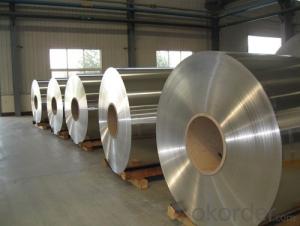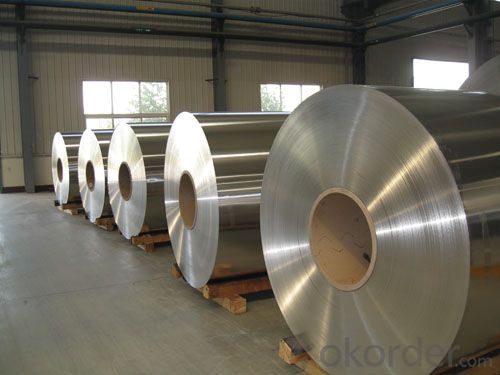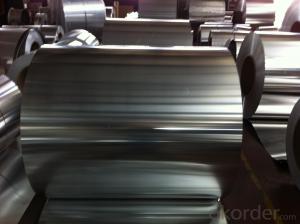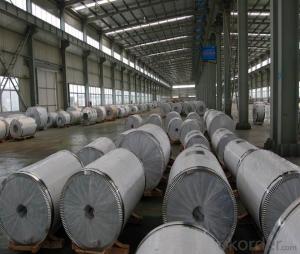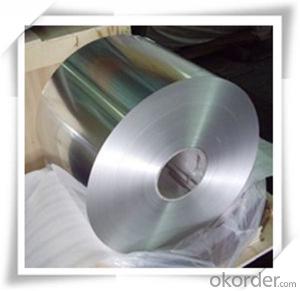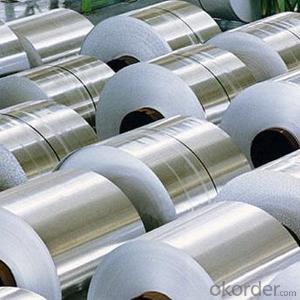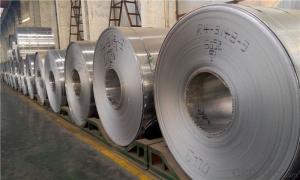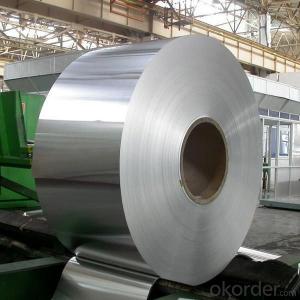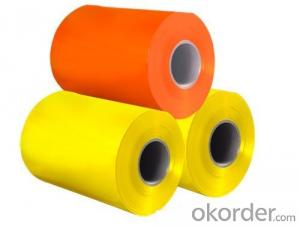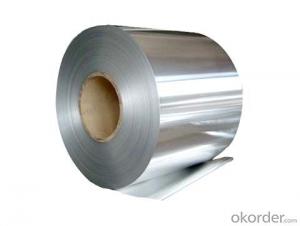1100 H14 Mill Finished Aluminum Coil for Decoration Materials Production
- Loading Port:
- Shanghai
- Payment Terms:
- TT OR LC
- Min Order Qty:
- 1 m.t.
- Supply Capability:
- 60000 m.t./month
OKorder Service Pledge
OKorder Financial Service
You Might Also Like
Specification
Mill Finished Aluminium Coil For Decoration Materials Production
Alloy | 1050, 1060,1100, 3003 3004 3105 3A21 5005 5052 etc |
Temper | O/H12/H14/H1/H18/H32/H34/H36/H38//H111/H112/H116/H321/T6/T651/T3/T351 etc |
Thickness | 0.1mm to 6mm |
Width | 20mm to 3300mm |
Coil weight | 100kgs to 6 tons depends on actual requirement |
Core material | Aluminum or paper |
Coil inner diameter | 75mm, 150mm, 200mm, 300mm, 405mm, 505mm or as required |
Appplication | construction, roofing, decoration, lamping etc |
Package | eye to wall or eye to the wall for aluminum coil with wood pallet (wooded case also available) |
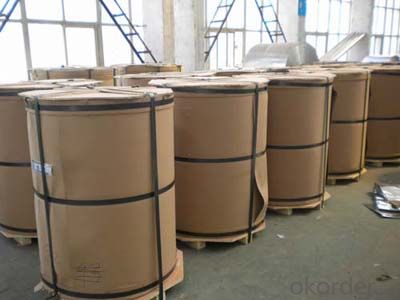
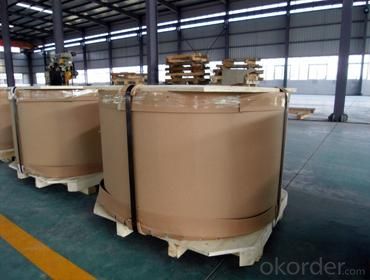
3) Glass curtain wall frame
4) Interior decoration
5) Elevator decoration
6) Signs, nameplate, bags making.
7) Automobile parts material
8) Office and Household appliances: HVAC equipments
9) The consumer electronics: mobile phones, digital cameras, MP3 .etc.
Coating varieties
Polyester Coatings (PE)
PE (polyester) coatings exhibit an excellent combination of hardness, flexibility, flow, appearance, and superior resistance to dirt retention in indoor and outdoor applications. These coatings are highly resistant to abrasion, metal marking, staining, and marring, and require minimal maintenance. Glazetech uses polyester paints which provide excellent colour and gloss retention properties.
Polyvinylidene Fluoride Coatings (PVDF)
PVDF (polyvinylidene fluoride) is a chemical resistant thick film barrier coating commonly used in architectural applications where both excellent appearance and substrate protection must be maintained over a long period of time. This coating is unaffected by most chemicals and solvents and has excellent wear and abrasion resistance. PVDF also has a high dielectric strength, excellent resistance to weathering and the ability to self extinguish.
FAQ
--Q: Do you provide free samples?
--A: Yes, free samples will be sent to you on freight at destination.
--Q: Can I get your latest products catalogue?
--A: Yes, it will be sent to you in no time.
--Q: What is the MOQ?
--A: 2 tons
--Q: What are your payment terms?
--A: We accept L/C, T/T.
--Q: What kinds of alloy can you supply?
--A: 1000 series: 1050, 1060, 1070, 1100, 1145, 1200
3000 series: 3003, 3004, 3105, 3104
5000 series: 5052, 5083, 5754, 5182
6000 series: 6061, 6063, 6062, 6063
8000 series: 8011, 8021
--Q: What’s the coating of top side?
--A: PVDF and PE coating
--Q: What kinds of temper can you supply?
--A: O-H112: O,H12,H14,H16,H18,H22,H24,H26,H,32,H34,H111,H112
T3, T4, T6
- Q: Can aluminum coils be used for architectural applications?
- Aluminum coils are indeed applicable for architectural purposes. With its versatility and lightweight nature, aluminum is an ideal material that boasts exceptional resistance against corrosion, making it suitable for numerous architectural applications. Exterior cladding, roofing, facades, and even interior uses like ceilings and wall panels can all benefit from the utilization of aluminum coils. These coils are easily malleable, cuttable, and moldable, allowing for flexibility in design and innovative architectural solutions. Moreover, aluminum coils can be coated with diverse finishes, such as paint or anodized coatings, to enhance both aesthetics and durability. All in all, due to their adaptability, durability, and aesthetic charm, aluminum coils are highly favored within the architectural industry.
- Q: What is color aluminum coil?
- The base plates are all aluminum, but the surface has been colored.
- Q: What is the maximum coil diameter for aluminum coils?
- The maximum coil diameter for aluminum coils can vary depending on the specific application and industry standards. However, in general, aluminum coils typically have a maximum diameter of around 72 inches (6 feet) to ensure ease of handling and transportation.
- Q: How are aluminum coils used in the packaging industry?
- Aluminum coils play a vital role in the packaging industry due to their excellent properties and versatility. These coils are used extensively in the packaging industry to create a wide variety of packaging materials. One of the primary uses of aluminum coils in the packaging industry is in the production of aluminum foil. Aluminum foil is a thin sheet of aluminum that is used for various packaging applications. It is flexible, lightweight, and has excellent barrier properties, making it ideal for preserving the freshness, taste, and quality of food products. Aluminum foil is commonly used for wrapping food items such as sandwiches, snacks, and leftovers. It is also used for packaging pharmaceutical products, cosmetics, and other consumer goods. Furthermore, aluminum coils are used to create aluminum cans, which are widely used for packaging beverages, such as soda, beer, and energy drinks. Aluminum cans are lightweight, durable, and provide excellent protection against light, oxygen, and moisture. They also have a longer shelf life compared to other packaging materials, ensuring the preservation of the product's taste and quality. In addition to aluminum foil and cans, aluminum coils are used in the production of blister packs, which are commonly used in the pharmaceutical industry. Blister packs consist of a plastic sheet with individual compartments that hold medications or capsules. The aluminum coil is laminated onto the plastic sheet, providing a barrier against light, moisture, and oxygen, ensuring the stability and integrity of the medications. Moreover, aluminum coils are utilized in the production of flexible packaging materials, such as pouches, sachets, and bags. These packaging materials are widely used for various products, including snacks, pet food, coffee, and personal care items. Aluminum coils are laminated onto plastic films to create a barrier against moisture, oxygen, and light, thereby extending the shelf life of the packaged products. Overall, aluminum coils are indispensable in the packaging industry, offering an array of benefits such as lightweight, durability, barrier properties, and versatility. From aluminum foil to cans, blister packs to flexible packaging materials, these coils are vital in preserving the freshness, taste, and quality of various products.
- Q: Can aluminum coils be used in telecommunications infrastructure?
- Yes, aluminum coils can be used in telecommunications infrastructure. Aluminum is a lightweight and durable material that is commonly used in various industries, including telecommunications. The use of aluminum coils in telecommunications infrastructure offers several advantages. Firstly, aluminum is a cost-effective material compared to other metals like copper. It is readily available and has a lower price point, making it a preferred choice for many telecommunications companies. Additionally, aluminum coils are lighter in weight, which makes them easier to handle and install, reducing the overall labor and transportation costs. Moreover, aluminum has excellent electrical conductivity, making it suitable for transmitting data signals in telecommunications networks. Aluminum coils can effectively carry electrical current, ensuring efficient data transmission without any significant loss in quality. This conductivity enables reliable and high-speed communication over long distances. Another advantage of using aluminum coils in telecommunications infrastructure is their resistance to corrosion. Aluminum naturally forms a protective oxide layer when exposed to air, preventing it from rusting or corroding easily. This resistance to corrosion ensures the longevity and durability of the infrastructure, reducing maintenance and replacement costs over time. However, it is important to note that aluminum has a lower tensile strength compared to copper. Therefore, proper engineering and design considerations need to be taken to ensure the structural integrity of the infrastructure when using aluminum coils. Additionally, specific connectors and hardware compatible with aluminum may be required. In conclusion, aluminum coils can be effectively used in telecommunications infrastructure due to their cost-effectiveness, lightweight, electrical conductivity, and resistance to corrosion. Proper planning and design are necessary to ensure the successful implementation of aluminum coils in telecommunications networks.
- Q: What are the maintenance requirements for aluminum coils?
- The maintenance requirements for aluminum coils typically involve regular cleaning to remove dirt and debris, inspection for any signs of corrosion or damage, and ensuring proper airflow around the coils to prevent overheating. Additionally, periodic lubrication of moving parts and regular filter replacement are recommended to maintain optimal performance and efficiency.
- Q: What specific tools are necessary for handling and working with aluminum coils?
- <p>When working with aluminum coils, there are several special tools that may be required. These include cutting tools designed for metal, such as metal shears or a bandsaw with a metal cutting blade, to cut the coils without damaging the material. A coil car or lifting equipment is necessary for safely moving and positioning heavy coils. Additionally, a coil leveler may be needed to straighten and flatten the coils for processing. Safety equipment such as gloves and goggles is also essential to protect against sharp edges and flying debris. It's important to use tools that are suitable for the specific aluminum alloy and thickness to ensure efficient and safe handling.</p>
- Q: What is the tensile strength of an average aluminum coil?
- The tensile strength of an average aluminum coil can vary depending on the specific alloy and temper of the aluminum. However, on average, aluminum coils typically have a tensile strength ranging from 13,000 to 30,000 pounds per square inch (psi). It is important to note that this range is a general approximation, and the actual tensile strength can be influenced by factors such as the manufacturing process, alloy composition, and any heat treatments applied to the aluminum.
- Q: Is it possible to customize the dimensions of aluminum coils?
- Indeed, the dimensions of aluminum coils can be tailored to suit individual preferences. Customers are able to request and obtain aluminum coils that have been manufactured and trimmed to specific measurements in accordance with their particular requirements and specifications. This customization procedure entails the meticulous cutting and molding of the aluminum coil in order to achieve the desired dimensions. This capability offers versatility across a range of industries and applications, where precise coil sizes are indispensable. By customizing the dimensions of aluminum coils, they become perfectly compatible with various production procedures, machinery, or end-use applications.
- Q: Can aluminum coils be used in food storage facilities?
- Aluminum coils are capable of being employed in food storage facilities. The food industry extensively employs aluminum due to its exceptional properties, including its lightweight nature, durability, resistance to corrosion, and effective heat conductivity. These attributes render aluminum coils suitable for a variety of applications within food storage facilities. Refrigeration systems, air conditioning units, and food storage cabinets are just a few examples of where aluminum coils can be utilized. Furthermore, aluminum is non-toxic and has no adverse reaction with food or its flavor, thus establishing it as a secure option for food storage. However, it is crucial to ensure that the aluminum coils used in food storage facilities undergo proper cleaning and maintenance to prevent any potential contamination.
Send your message to us
1100 H14 Mill Finished Aluminum Coil for Decoration Materials Production
- Loading Port:
- Shanghai
- Payment Terms:
- TT OR LC
- Min Order Qty:
- 1 m.t.
- Supply Capability:
- 60000 m.t./month
OKorder Service Pledge
OKorder Financial Service
Similar products
Hot products
Hot Searches
Related keywords
